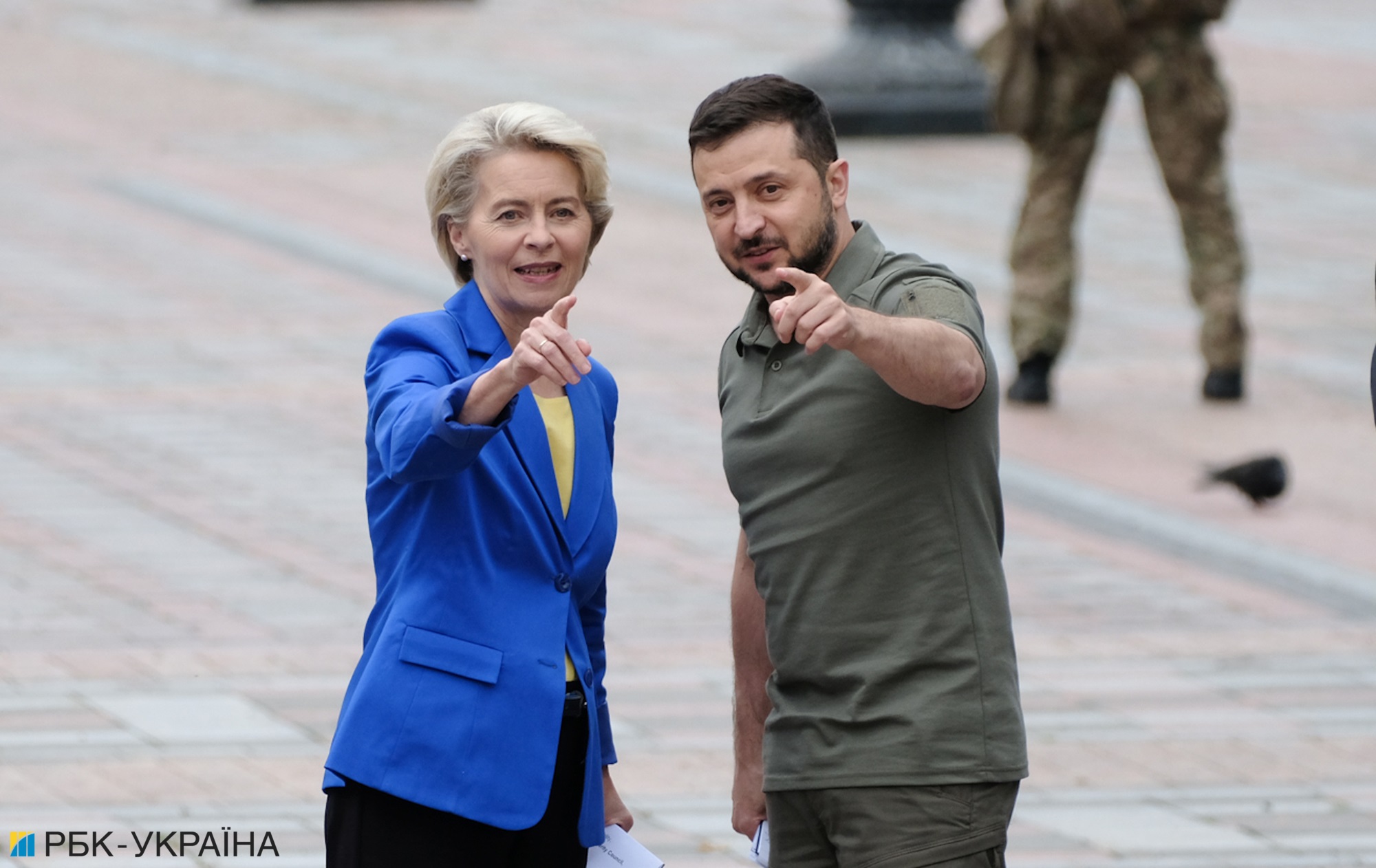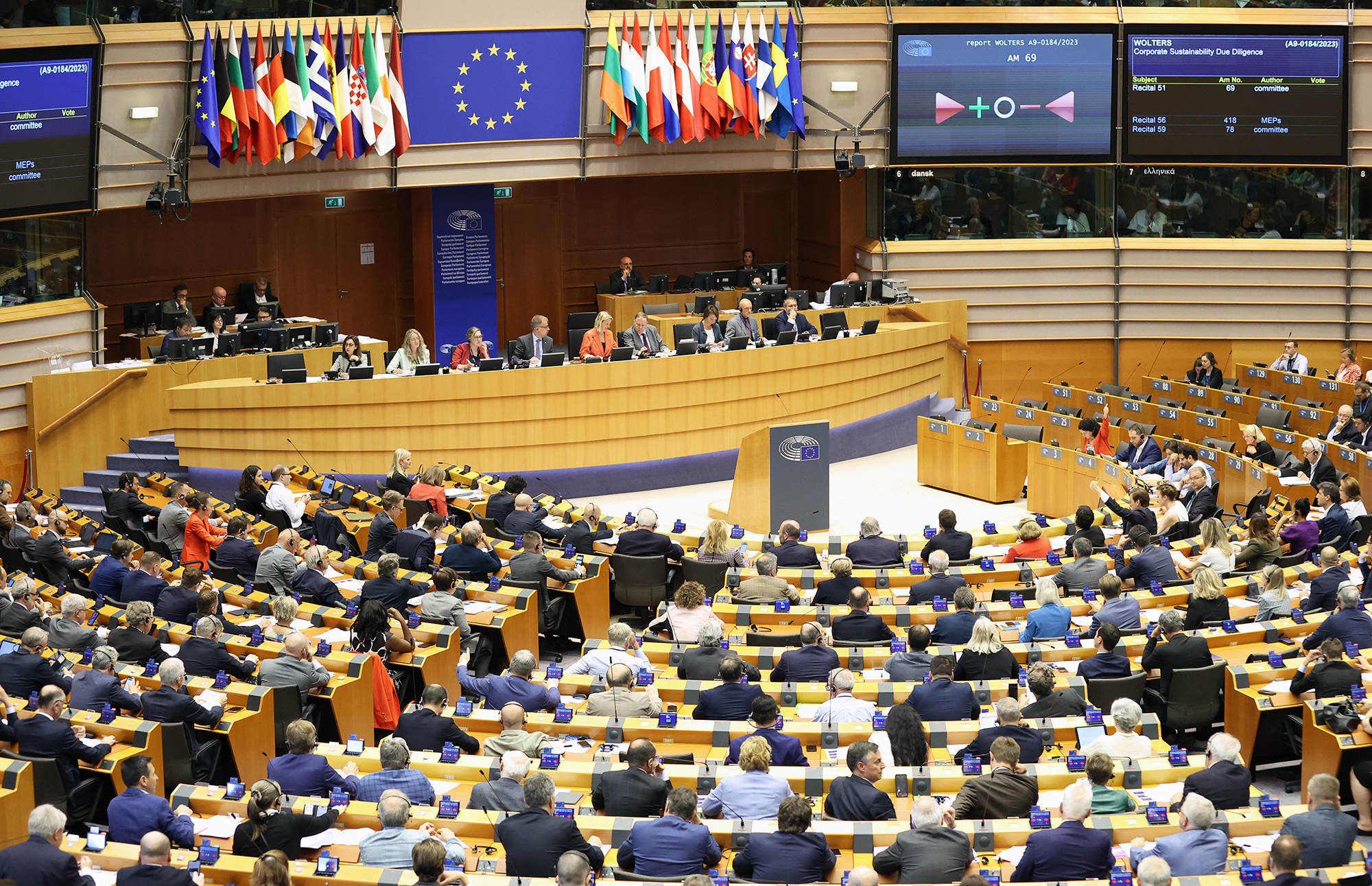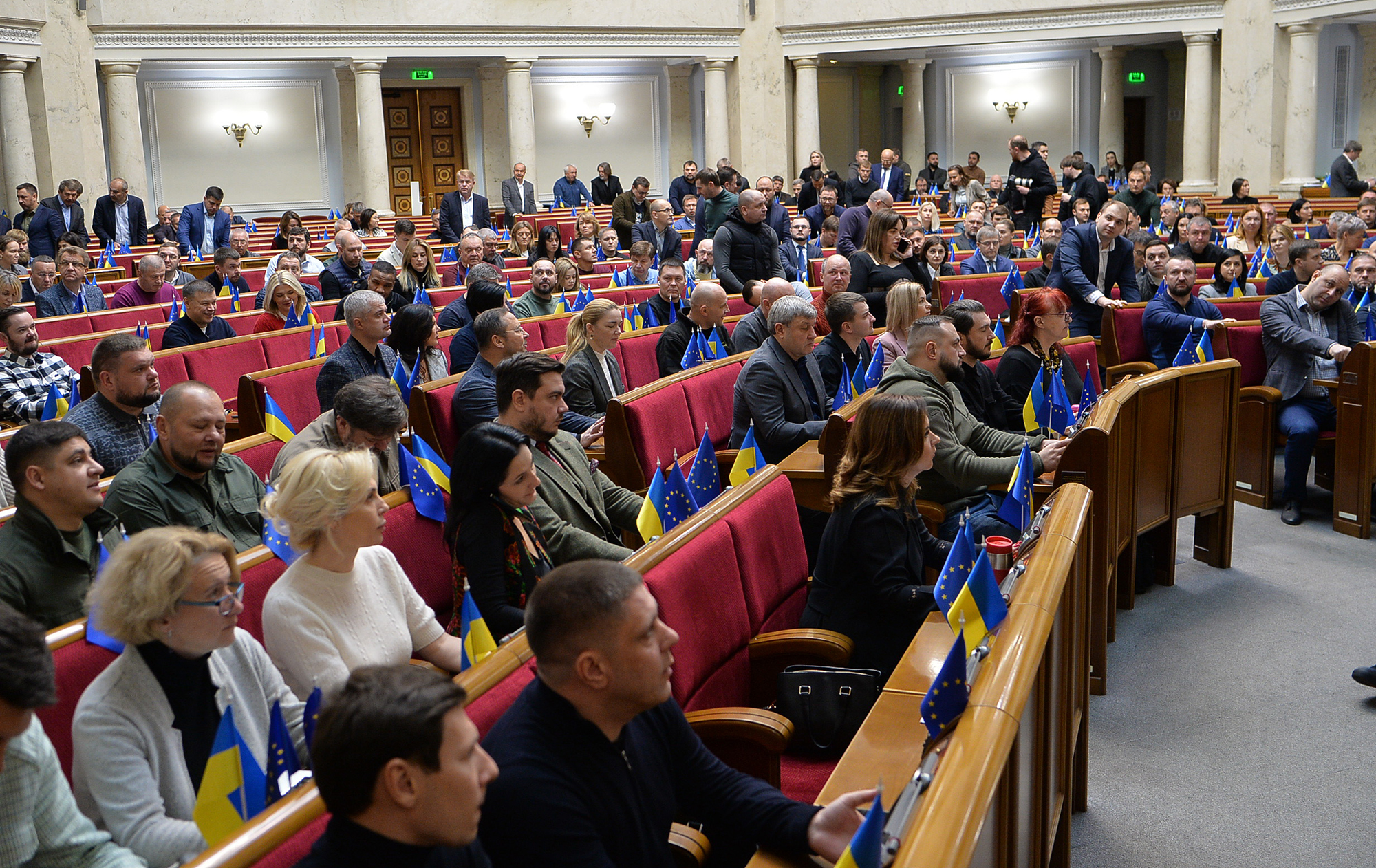Final step toward the EU: Who are PEPs and why new law stirred up controversy
 Ruslan Stefanchuk, Denys Shmyhal, Volodymyr Zelenskyy, Semen Kryvonis (Photo: collage by RBC-Ukraine)
Ruslan Stefanchuk, Denys Shmyhal, Volodymyr Zelenskyy, Semen Kryvonis (Photo: collage by RBC-Ukraine)
The law on politically exposed persons (PEPs) has become the latest condition for Ukraine's accession negotiations with the EU, and it has even sparked heated criticism among those advocating for European integration. What is this law, and why is it being discussed is analyzed in the article by RBC-Ukraine.
This material includes comments from Vasyl Furman, a member of the NBU Council, legal expert Oleksandr Kalitenko from Transparency International Ukraine, and Member of Parliament Yaroslav Yurchyshyn, along with information from open sources.
On October 17, the Verkhovna Rada (Ukraine's parliament) passed a law regarding politically exposed persons, which sparked vigorous discussions in the media and on social networks that continue to this day. The main point of contention for those affected by the PEP status is the lifetime financial monitoring. The passage of this law was also the last condition for commencing negotiations on Ukraine's accession to the European Union and receiving macro-financial assistance from the IMF.
Supporters of the law argue that Ukraine has no other option but to follow the European plan outlined for it. Additionally, they believe that financial monitoring of high-ranking officials will help combat corruption more effectively. On the other hand, opponents argue that the law will not yield significant anti-corruption results and will only complicate the lives of those it applies to.
Affected persons
According to the law passed by the Rada, PEPs include all officials in category A, current and former. This category includes the president, the head of the president's office and its deputies, the prime minister, members of the Cabinet of Ministers and their deputies, the head of the State Management of Affairs, heads of the offices of state bodies (whose positions fall under category A), the Secretary of the National Security and Defense Council and its deputies, and members of parliament from both current and previous sessions.
Furthermore, the head and members of the board and council of the National Bank, the head and judges of the Constitutional Court, the Supreme Court, and special courts, members of the High Council of Justice and the High Qualification Commission, the Prosecutor General, the head of the Security Service of Ukraine, the heads of National Anti-Corruption Bureau of Ukraine, State Bureau of Investigation, and Economic Security Bureau of Ukraine with their deputies, extraordinary and plenipotentiary ambassadors, the Chief of the General Staff, the Commander-in-Chief of the Armed Forces, and commanders of various branches of the military all fall under category A. In total, according to analysts, there are approximately 10,000 PEPs in Ukraine.

The head of the European Commission Ursula von der Leyen and President Volodymyr Zelenskyy in Kyiv (Photo: Vitalii Nosach / RBC-Ukraine)
According to the law, all the individuals listed have access to the state treasury, and where there is a treasury, there are corruption risks. Therefore, individuals in category A and their immediate relatives are subject to more thorough scrutiny regarding their income sources. Any suspicious amount deposited in a bank account must be immediately frozen, and an investigation is initiated into its presence.
The law on lifetime financial monitoring for PEPs was initially passed in December 2019, with the understanding that it was one of the conditions for negotiations with the European Union and the International Monetary Fund. Immediately after Rada's vote, President Volodymyr Zelenskyy announced agreements with the IMF for a three-year financing program of $5.52 billion.
However, in 2022, half a year after the full-scale war began, the Rada decided to abolish the lifetime PEP status, replacing it with a three-year period from when the official leaves their position. This amendment was proposed by MPs Hryhorii Mamka from the "Opposition Platform - For Life" faction and Artur Herasymov from the "European Solidarity" faction. Their proposal was supported in the Rada, which raised questions among Ukraine's allies, according to Oleksandr Kalitenko, legal advisor for Transparency International Ukraine.
"Of course, it was very important for us to avoid the impression that during a full-scale war when the country receives a lot of financial assistance from abroad, Ukrainian PEPs are trying to hide something. But, unfortunately, this was voted for," Kalitenko noted in a comment to RBC-Ukraine.
"A year later, the Verkhovna Rada returned to the issue of PEPs, overturning their own decision," Kalitenko noted.
Lifelong financial monitoring
On October 17, the Ukrainian Parliament voted in favor of an amendment to the bill on PEPs. This amendment pertains to the establishment of lifelong financial control for current and former high-ranking officials. In this way, the Parliament has finally aligned the law with the standards of the Financial Action Task Force (FATF) for combating money laundering. Moreover, the integration of this document into Ukrainian legislation marked the final step for the start of negotiations between Ukraine and the European Union. The course toward EU and NATO membership is one of Ukraine's fundamental goals, as enshrined in the Constitution.
According to the National Bank of Ukraine (NBU), referring to this as "lifelong" financial monitoring for PEPs is incorrect. Banks already analyze various financial transactions for both politically significant and ordinary individuals, as stated by Vasyl Furman, a member of the National Bank Council, in a comment to RBC-Ukraine.
"There are many myths surrounding this law, but they are just myths. This law is a part of our state's anti-corruption transformation. In reality, this law aligns with FATF standards, and European directives, and serves as a structural beacon in our work with the International Monetary Fund. As for financial monitoring, banks conduct it regularly for all clients. PEPs have varying risk levels, and enhanced financial monitoring won't be lifelong. Today, every client, not just PEPs, undergoes financial monitoring procedures," he stated in a comment to RBC-Ukraine.

European Parliament (Photo: Getty Images)
Furman noted that enhanced financial monitoring will continue for 12 months after an official in category A leaves their position. If no risks are identified in their banking transactions during this period, the monitoring will continue but not as rigorously as before.
Given that the NBU increased the limit for financial transactions to 400,000 hryvnias last year, problems are unlikely to arise, according to Kalitenko. "Not even every high-ranking official has such a salary. We understand why the limit was lower before, but now they've equalized the limit for PEPs and individuals, which is a step toward accommodating PEPs," the expert added.
In reality, enhanced monitoring looks like this: any potentially complex and substantial financial transaction will be analyzed by bank managers, not ordinary bank employees, Kalitenko explained. There is a risk that banks, to avoid dealing with potentially "inconvenient" clients, might refuse to provide services on the grounds that they are PEPs. Immediately after the bill's passage, many PEPs began sharing their stories on social media. However, fines are provided to deter such practices - banks that unreasonably refuse service could be fined 10 million hryvnias, and non-banking institutions could face a 1.7 million hryvnia fine. The effectiveness of this penalty system in practice remains an open question.
Similar schemes of essentially lifelong financial monitoring are already being used abroad, as RBC-Ukraine's sources point out. FATF includes most European countries, as well as the United States, Mexico, Japan, and New Zealand, only 37 countries in total, European Commission and Gulf Cooperation Council. Ukrainian high-ranking officials will also undergo enhanced financial monitoring while in FATF member countries and when banking with their institutions.
"Even if our PEPs here were limited to three years, they would still come to foreign banks in the fourth year and be considered PEPs there, subject to additional questioning and interviews. This is something our officials cannot avoid in foreign institutions," Kalitenko added.
Potential fears
Opponents of the law on lifelong monitoring primarily use two arguments - in their opinion, since the law's adoption, banks will significantly complicate the lives of PEPs and, as a precaution, might simply stop serving them. This leads to the second argument - the concept of public service at the highest level becomes synonymous with discomfort and constant scrutiny.
This is largely stated by the PEPs themselves. For example, former head of the State Customs Service Maksym Nefiodov pointed out that the new law makes top officials almost pariahs. "The proposed anti-corruption mechanisms do a huge disservice to the quality of public service because good people don't want/can't go there. It has reached the point where, without jokes, in response to these accusations, they say: 'Well, public service is unattractive anyway, another restriction regarding PEPs won't significantly worsen it,'" Nefiodov wrote on his Facebook page.
He also notes that top officials are already facing problems, like bank clients who can be refused services based solely on their PEP status. To avoid loose interpretation and minimize manipulation, in addition to fines, the law should clearly define risk indicators. This is currently a weak point in the adopted bill, according to MP and first deputy chairman of the anti-corruption committee, Yaroslav Yurchyshyn.
"The quality of the law is low - that's a fact. Clearly defined risk indicators or at least an assignment to the National Bank and regulators are not included in the law. This is a significant challenge because everything will depend on the financial monitoring by banks and the activity of the National Bank," Yurchyshyn said in a comment to RBC-Ukraine.
Perhaps the law's quality was affected by the fact that the Ukrainian side, having had several years to regulate the PEPs and clarify all the nuances themselves, did neither. By the time the question of starting negotiations for EU accession was at its final stage, negotiators simply didn't have enough time to take more advantageous positions.

Verkhovna Rada (Photo: Getty Images)
"The question was posed in a highly cynical manner - either we vote for the existing law because negotiators from both our side and the EU, as well as the IMF, have not agreed on another, or we do not vote for this project, and here two scenarios arise. The first one, which is unlikely, is that they forgive it and start negotiations with the EU without it. The second, which is more likely, is that negotiations are postponed," added Yurchyshyn.
The fact that the law on PEPs, which was actually adopted several years ago, is now causing a storm of reactions, primarily indicates a failure in communication between the government and the public servants. The current discussions about abuse by banks, the possible registry of top officials, the lack of understanding of how the law will affect the fight against corruption, and the fact that the law itself was written without considering restraining mechanisms - all result from haste, which could have been avoided.
Today, the mechanism for regulating banks' work with politically significant individuals is expected from the National Bank. The NBU should establish rules according to which banking institutions will provide financial services to PEPs. It's difficult to say whether the NBU will be able to fully anticipate all possible problems that may arise. One can only hope that the law will settle in over time, and negotiations for Ukraine's EU accession, obtained at such a high cost, won't be prolonged indefinitely.

